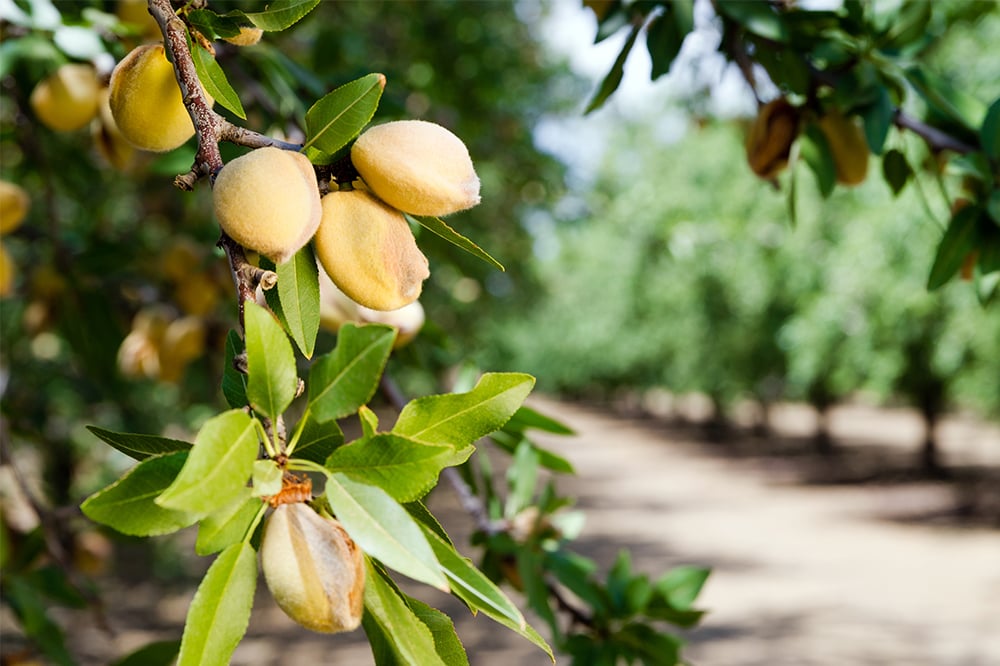
Risk & Insurance
Nuts to You (Not the Thieves!): A 360° Approach to Nut-Theft Risk Management


Nut theft is no joking matter—it’s a significant and growing threat to California’s $9 billion+ nut-tree business. With more than 30 nut-theft events in 2015 compared to just one in 2009 and four in 2014, what once warranted only local agricultural area media coverage now garners national mainstream attention. The 2015 price tag? $4.6 million.
That’s enough of a hit to a vital California industry to make the state’s legislature sit up and take notice. Last year, both houses passed a bill—in record time—to establish a statewide, cross-jurisdictional “Agricultural Cargo Theft Working Group.” This funding mechanism would have activated and aligned numerous law-enforcement agencies in helping target these crimes, but Governor Brown unexpectedly vetoed the legislation on September 21, 2016. Additional legislation is in the works to increase criminal penalties for thieves from a misdemeanor to a felony.
Tailoring Insurance Coverage
In the event they are the victim of nut theft, growers should have a strong post-loss solution. As such, it’s important they work with an agent or broker with specialized expertise to ensure they have properly structured insurance placements. The analysis starts with contract review: Who bears the risk, and are there “handoffs” along the path from tree to processor to final end-user? Only when these terms are understood can insurance coverage be negotiated and implemented.
Why Steal Nuts?
- They’re valuable: A truckload of nuts, especially almonds, walnuts, and pistachios, can range from $100-500K.
- They’re in demand: Touted health benefits and drought have strained supply.
- They’re not easily traced: Unlike electronics, nuts don’t have serial numbers!
- They vanish quickly: By the time a theft is discovered, the nuts are often already on a ship or broken into smaller loads and dispersed to out-of-state destinations.
The following approaches are available to growers and distributors:
- Commercial-Package Policy
There may be some coverage for Business Personal Property Stock in Transit under the basic policy form. However, this transit coverage tends to cover only a limited number of perils, so relying on this extension could lead to an uncovered loss. - Cargo/Transit Policy
Once the shipment is in the correct trucking carrier’s control, ensure the trucking carriers’ cargo policies do not exclude theft for any reason other than employee dishonesty, which is excluded by most cargo policies (this can be easily covered with a separate crime policy). Many trucking cargo policies will exclude or limit theft coverage if the vehicle is unattended or if a trailer is dropped. Additionally, consider requiring a crime policy to cover theft by employees of the trucking carrier (including theft by the dispatcher and/or the driver). - Stock-Throughput Policy (STP)
An STP offers growers and distributors the most comprehensive protection: Goods are covered at all times whether they’re being moved, processed, or stored. An STP can be an “all risk” type of insurance policy that provides seamless coverage from end to end and protects against perils including earthquakes, floods, and contamination.
Pre-Loss Risk Control
Growers and distributors should do everything possible on their end to prevent a theft situation, but orchard premises security (i.e., fencing, cameras, a guard service, etc.), is not an end-all-be-all solution. Nut theft is more commonly an act of fraud rather than an act of force.
Perpetrators are often part of organized crime groups, using sophisticated technologies to hack into trucking firms and utilize Department of Transportation databases. “Drivers” show up with high-quality, legitimate-looking paperwork. These forged documents incorporate burner phone numbers and enable thieves to steal shipping information and to quickly move the product to the black market stream of commerce. The thieves, and their loot, become immediately untraceable.
Growers/distributors can take any of the following precautions to prevent theft:
- Develop a relationship with a few select trucking carriers with whom a consistent protocol can be established to confirm the correct drivers are picking up the loads.
- Ensure your computer systems’ security is state-of-the-art, and ask carriers about their data integrity.
- Call the carrier on the phone number provided during the originally contracted shipment and not the phone number given on any shipping documents (given their potential fraudulent nature). Require those firms to advise detailed information at least 24 hours in advance of pick up.
- Get each driver’s license number and thumbprint.
- Photograph both the driver and his/her truck.
- Consider using radio-frequency trackers to ensure the loads end up where intended.
Because of the potential high profits and low risk, nut theft continues to be alluring for thieves and a challenge for growers/distributors. Taking a 360° risk-management approach—contract review, insurance program design, and pre-loss prevention can go a long way towards minimizing or, at best, avoiding exposure to loss.
About the Authors
Greg Merrill is Senior Vice President and Director of Crop Insurance Services of our Pan American business unit. Greg has been helping agribusiness clients manage a wide range of operating risks for more than 13 years.
Andy Sharpe is Regional Transportation Leader for Ascension’s Transure business unit. For more than 15 years, Andy has focused on transportation risk management and insurance, and is a renowned industry specialist.

